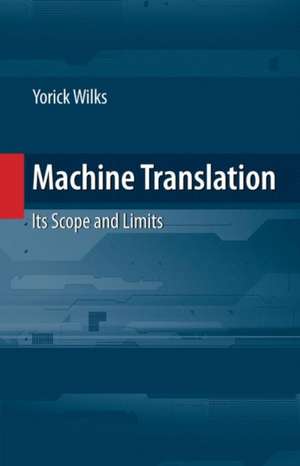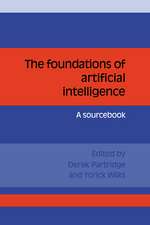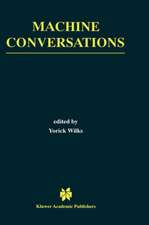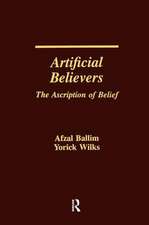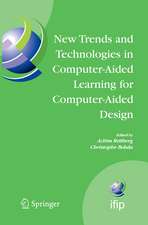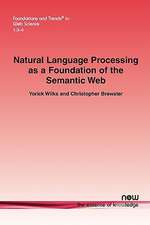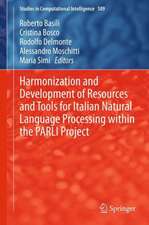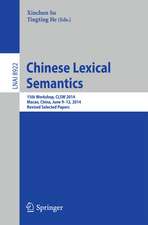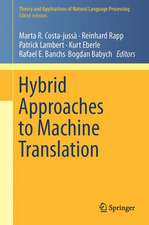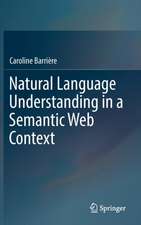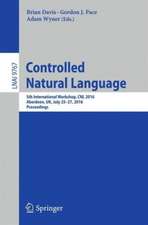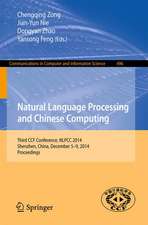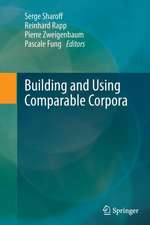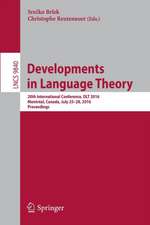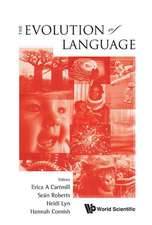Machine Translation: Its Scope and Limits
Autor Yorick Wilksen Limba Engleză Hardback – 14 noi 2008
This book presents a history of machine translation (MT) from the point of view of a major writer and innovator in the subject. It describes and contrasts a range of approaches to the challenges and problems of this remarkable technology by means of a combination of historic papers along with commentaries to update their significance, both at the time of their writing and now. This volume chronicles the evolution of conflicting approaches to MT towards a somewhat skeptical consensus on future progress. Also included is a discussion of the most recent developments in the field and prospects for the future, which have been much changed by the arrival of the World Wide Web.
| Toate formatele și edițiile | Preț | Express |
|---|---|---|
| Paperback (1) | 757.66 lei 43-57 zile | |
| Springer Us – 4 noi 2010 | 757.66 lei 43-57 zile | |
| Hardback (1) | 820.83 lei 43-57 zile | |
| Springer Us – 14 noi 2008 | 820.83 lei 43-57 zile |
Preț: 820.83 lei
Preț vechi: 1026.04 lei
-20% Nou
Puncte Express: 1231
Preț estimativ în valută:
157.07€ • 164.40$ • 130.73£
157.07€ • 164.40$ • 130.73£
Carte tipărită la comandă
Livrare economică 31 martie-14 aprilie
Preluare comenzi: 021 569.72.76
Specificații
ISBN-13: 9780387727738
ISBN-10: 0387727736
Pagini: 252
Ilustrații: X, 252 p.
Dimensiuni: 156 x 235 x 16 mm
Greutate: 0.54 kg
Ediția:2009
Editura: Springer Us
Colecția Springer
Locul publicării:New York, NY, United States
ISBN-10: 0387727736
Pagini: 252
Ilustrații: X, 252 p.
Dimensiuni: 156 x 235 x 16 mm
Greutate: 0.54 kg
Ediția:2009
Editura: Springer Us
Colecția Springer
Locul publicării:New York, NY, United States
Public țintă
ResearchCuprins
MT Past.- Five Generations of MT.- An Artificial Intelligence Approach to Machine Translation.- It Works but How Far Can It Go: Evaluating the SYSTRAN MT System.- MT Present.- Where Am I Coming From: The Reversibility of Analysis and Generation in Natural Language Processing.- What are Interlinguas for MT: Natural Languages, Logics or Arbitrary Notations?.- Stone Soup and the French Room: The Statistical Approach to MT at IBM.- The Revival of US Government MT Research in 1990.- The Role of Linguistic Knowledge Resources in MT.- The Automatic Acquisition of Lexicons for an MT System.- MT Future.- Senses and Texts.- Sense Projection.- Lexical Tuning.- What Would Pragmatics-Based Machine Translation be Like?.- Where was MT at the End of the Century: What Works and What Doesn’t?.- The Future of MT in the New Millennium.
Recenzii
From the reviews:
"Yorick Wilks, one of the most famous MT researchers, gives an interesting overview of the past, present, and future of MT; thus, the reader learns about the scope and limits of MT, justifying the subtitle of the book. … It could be useful to anyone working in the translation business and in NLP. Translators will learn about the historical context of MT, which will make it easier to understand its scope and limitations … . In conclusion, I do recommend this book." (K. Waldhör, ACM Computing Reviews, June, 2009)
“This book presents the author’s views and the culmination of his research in the field over the course of this period using his own previously published articles as a kind of roadmap through history, with additional afterwords supplementing most chapters bringing previous work into a more modern context. … if you are looking to skim a stone through MT’s history dipping into the extensive related work of this seasoned author, this book makes for an interesting and enjoyable read.” (Sara Morrissey, Machine Translation, Vol. 23, 2009)
"Yorick Wilks, one of the most famous MT researchers, gives an interesting overview of the past, present, and future of MT; thus, the reader learns about the scope and limits of MT, justifying the subtitle of the book. … It could be useful to anyone working in the translation business and in NLP. Translators will learn about the historical context of MT, which will make it easier to understand its scope and limitations … . In conclusion, I do recommend this book." (K. Waldhör, ACM Computing Reviews, June, 2009)
“This book presents the author’s views and the culmination of his research in the field over the course of this period using his own previously published articles as a kind of roadmap through history, with additional afterwords supplementing most chapters bringing previous work into a more modern context. … if you are looking to skim a stone through MT’s history dipping into the extensive related work of this seasoned author, this book makes for an interesting and enjoyable read.” (Sara Morrissey, Machine Translation, Vol. 23, 2009)
Notă biografică
Yorick Wilks is Professor of Artificial Intelligence at the University of Sheffield and a Senior Research Fellow at the Oxford Internet Institute. He is a Fellow of the American and European Associations for Artificial Intelligence, and a member of the UK Engineering and Physical Sciences Research Council (EPSRC) College of Computing. He is the permanent UK member of the International Committee on Computational Linguistics that runs COLING, the world’s major biennial conference. His doctorate at Cambridge was in metaphysical argument, and before Sheffield and Oxford he researched and taught at Cambridge, Stanford, Edinburgh, Essex, and New Mexico State Universities. He has worked on major Government MT projects in the EU (Eurotra) and the US (Pangloss) and was for many years a US Government consultant on the evaluation of MT systems. In 1997 a team working with his design won the Loebner Prize in New York for the best computer conversationalist of the year. He has been a founder, editor or on the Editorial Board of many journals, including the eponymous Journal of Machine Translation. He has written some seven books in the area of Artificial Intelligence and language, published by Routledge. Kluwer, Ablex, Springer and MIT and Cambridge University Presses, the most recent being "Electric Words" (MIT Press, with Louise Guthrie and Brian Slator) and "Artificial Believers" (Ablex, with Afzal Ballim). He is currently the Coordinator of the 13meuro, 4 year, 15 site, European Commission Integrated Project COMPANIONS (see http://www.nlp.shef.ac.uk/companions/) that seeks to develop intelligent, personalized, permanent, conversational interfaces to the Internet.
Wilks was awarded the Antonio Zampolli prize by the European Language Resources Association in 2008. This prize is given to individuals whose work lies within the areas of Language Resources and Language Technology Evaluation with acknowledged contributions to theiradvancements. He was also the recipient of an ACL Life Achievement Award at the 46th Annual Meeting of the Association for Computational Linguistics this year.
Wilks was awarded the Antonio Zampolli prize by the European Language Resources Association in 2008. This prize is given to individuals whose work lies within the areas of Language Resources and Language Technology Evaluation with acknowledged contributions to theiradvancements. He was also the recipient of an ACL Life Achievement Award at the 46th Annual Meeting of the Association for Computational Linguistics this year.
Textul de pe ultima copertă
Machine Translation is the author’s comprehensive view of machine translation (MT) from the perspective of a participant in its history and development. The text considers MT as a fundamental part of Artificial Intelligence and the ultimate test-bed for all computational linguistics, covering historical and contemporary systems in Europe, the US and Japan.
The author describes and contrasts a range of approaches to MT’s challenges and problems, and shows the evolution of conflicting approaches to MT towards some kind of skeptical consensus on future progress. The volume includes historic papers, updated with commentaries detailing their significance both at the time of their writing and now. The book concludes with a discussion of the most recent developments in the field and prospects for the future, which have been much changed by the arrival of the World Wide Web.
Anyone interested in the progress of science and technology, particularly computer scientists and students, will find this a fascinating exploration of MT technology.
Yorick Wilks is a Professor of Computer Science at the University of Sheffield, where he directs the Institute for Language, Speech and Hearing. He received his M.A. and Ph.D. (1968) from Pembroke College, Cambridge. He has also taught or researched at Stanford, Edinburgh, Geneva, Essex and New Mexico State Universities. His interests are artificial intelligence and the computer processing of language, knowledge and belief. He is a Fellow of the European and American Societies for Artificial Intelligence, a Fellow of the EPSRC College of Computing and a member of the UK Computing Research Council.
Wilks was awarded the Antonio Zampolli prize by the European Language Resources Association in 2008. This prize is given to individuals whose work lies within the areas of Language Resources and Language Technology Evaluation with acknowledged contributions to their advancements. He was also therecipient of an ACL Life Achievement Award at the 46th Annual Meeting of the Association for Computational Linguistics in 2008.
The author describes and contrasts a range of approaches to MT’s challenges and problems, and shows the evolution of conflicting approaches to MT towards some kind of skeptical consensus on future progress. The volume includes historic papers, updated with commentaries detailing their significance both at the time of their writing and now. The book concludes with a discussion of the most recent developments in the field and prospects for the future, which have been much changed by the arrival of the World Wide Web.
Anyone interested in the progress of science and technology, particularly computer scientists and students, will find this a fascinating exploration of MT technology.
Yorick Wilks is a Professor of Computer Science at the University of Sheffield, where he directs the Institute for Language, Speech and Hearing. He received his M.A. and Ph.D. (1968) from Pembroke College, Cambridge. He has also taught or researched at Stanford, Edinburgh, Geneva, Essex and New Mexico State Universities. His interests are artificial intelligence and the computer processing of language, knowledge and belief. He is a Fellow of the European and American Societies for Artificial Intelligence, a Fellow of the EPSRC College of Computing and a member of the UK Computing Research Council.
Wilks was awarded the Antonio Zampolli prize by the European Language Resources Association in 2008. This prize is given to individuals whose work lies within the areas of Language Resources and Language Technology Evaluation with acknowledged contributions to their advancements. He was also therecipient of an ACL Life Achievement Award at the 46th Annual Meeting of the Association for Computational Linguistics in 2008.
Caracteristici
Author won Antonio Zampolli prize for outstanding contributions to the language technology Comprehensive look at MT technology from the perspective of a participant in its history and development Details the deep differences and struggles between rival groups on how best to do MT Considers MT as a fundamental part of Artificial Intelligence and the ultimate test-bed for all computational linguistics Includes supplementary material: sn.pub/extras
